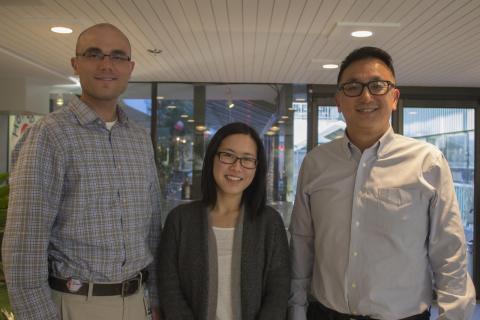
Cyclotrons. Targetry. Nuclear medicine. These are not the usual items that draw a business-oriented mind into a physics laboratory, but it was for Karen Young. Karen, a fourth year commerce student from UBC’s Sauder School of Business, spent a semester at TRIUMF gaining work experience towards her co-op designation. Every year, approximately 80 students from Canadian universities come to TRIUMF for an undergraduate co-op work experience – though most of those students hail from science programs.
At TRIUMF, Karen is developing a financial model that will facilitate decision making for the commercialization of isotope production that includes the manufacturing and processing.
“This co-op experience has showed me the bridge between science and business,” said Karen.
For a dynamic student like Karen, this bridge is a natural place to be. With her foundation in accounting and business, Karen has explored classes in chemistry and English, and even volunteered at a pharmaceutical company and a hospital.
Her co-supervisors, Paul Schaffer, Head of Nuclear Medicine, and Henry Chen, Chief Finance Officer, exposed Karen to all activities and components involved in the production of the diagnostic medical isotope, Tc-99m, from target unit prices to batch processing.
"The ability to bring in a student from Sauder School of Business to help TRIUMF, a particle physics lab, understand the business case behind medical isotope production, represents an example of how science is becoming increasingly integrated into the economy of BC and Canada," said Paul Schaffer, Head of Nuclear Medicine.
Karen has exposure to a project that most business students don’t get to see. “This is not a conventional path for most business students,” explained Karen. When Karen isn’t applying her accounting skills and industrial costing techniques, she is saturated with knowledge about isotopes, patient scans, and hospital deliveries.
At the end of her four-month term, Karen will have developed a model to illustrate the level of viability for each activity and component within Tc-99m production and made recommendations for which components should be outsourced.
“Coupled with Karen's inquisitiveness and tenacity, her educational training at Sauder (UBC) provided the necessary platform to take on this assignment,” said Henry. “Sauder's co-op program is such a tremendous resource for industry.”
When postulating career plans, Karen said that she would like to continue mixing her academic interests and work for an organization that has strong social values. “I’m doing something that is for the good of Canadians,” said Karen. “I want to continue on this path.”
As her term comes to an end, Karen reflected on her time: “Working at TRIUMF has been incredibly enriching – I’ve learned more here than I ever thought I would.”
-Melissa M. Baluk, Communications Coordinator
